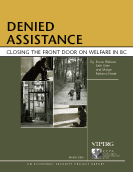VIPIRG in the news
Op-Ed: Envisioning the future of welfare reform
Marge Reitsma-Street and Bruce Wallace
Victoria Times-Colonist, page A11
April 5, 2005
It was this time last year when thousands of people receiving welfare expected to be cut off benefits as part of the provincial government's reform package that included a two-year time limit on welfare.
After lobbying by faith groups, school boards, municipal governments and welfare advocates, the Ministry of Human Resources announced on Feb. 6, 2004, an additional exemption: Those actively complying with their employment plan would not be terminated.
The welfare time limits was one of many significant changes introduced as law in 2002 for persons requiring income assistance due to ill health, unemployment, parenting responsibilities, and no savings. Other changes included: drastic restrictions on eligibility for welfare; elimination and cuts to benefits and appeals, including the 100-per-cent disincentive tax on employment earnings; closure of offices and support services; and increase in obligations to monitor compliance
The percentage of the population receiving welfare in B.C. is at its lowest in 30 years. Just four years ago, 191,938 persons received temporary assistance while looking for jobs or in short-term training programs; in January 2005 only 77,688 were eligible. The provincial government argues major reductions in caseloads indicate their welfare reforms are successful -- presumably because people are getting jobs.
Another reason for the decrease is that fewer persons are able to claim welfare. The eligibility rules are tougher and the process takes longer. Caseload reduction is a poor indicator of successful welfare reform, especially as there is no indication that the need for assistance has lessened.
Poverty rates in B.C. have not decreased with lower welfare caseloads, remaining just under 20 per cent. There is no evidence that if someone is not on welfare they are employed; nor are they or their children better off. The government argues claiming welfare promotes dependency. The public worries about the growing visibility of poverty in their cities.
Some argue the economy in British Columbia is booming. But for whom? There are more jobs and good times should be trickling down to all. There is no evidence, however, of a trickle, or even a dribble.
Those with insecure or low income are less, not more, able to find adequate child-care, employment, housing and food in 2005 compared to 2001.
Besides cuts to welfare, other services, subsidies and advocacy have been reduced since 2001, especially for people on low incomes and in poor neighbourhoods. Churches and agencies all report an increase in the use of food banks.
We all see more homeless people. Serious economic insecurity is a reality for many. More government Internet services, voicemail access, and short-term training cannot make up for higher caseloads, closed offices, reduced benefits, and loss of services.
Can there be another future for welfare? Economic progress is important when it promotes social well-being. Welfare laws could endorse the rights of people in British Columbia to civil rights of citizenship, livelihood and security, and the prohibition against involuntary work as stated in the Canadian Constitution and the UN Covenant on Economic, Cultural and Social Rights.
Mandatory provisions, based on rights, facts, experience and consultation, could put British Columbia in the forefront of progressive welfare reform in four ways:
1. Promote the well-being of persons and communities. Swift responses to crises prevent problems and costs. People and extended families in crisis will be seen within 48 hours by those capable of giving assistance.
2. Foster provisioning work. Provisioning work is defined as activities that provide for the necessities of life and includes parenting, health care for oneself and others, employment, and voluntary contributions to community welfare. There will be substantial financial and other resources provided to promote voluntary provisioning work activities.
3. Institute flexible public delivery of services. New avenues of delivery are to be explored in association with community public services such as libraries, schools and post offices.
4. Ensure accountability. Delivery of services will be publicly governed and welfare services will not be a source of private profit.
The welfare time limits remain law in B.C. Welfare reform continues to be touted as a success due to the single, flawed criteria of caseload reduction.
Meanwhile poverty reduction, social inclusion and reducing inequality are ignored as worthy goals or measures of success. It is time to modernize welfare to become a system that the public supports as a positive use of its resources.
We need income-assistance programs that work in the best interests of those who need it and for society as a whole. Our system currently lacks public confidence and support, cannot claim accountability, is riddled with unnecessary barriers and red tape and arguably does little to support self sufficiency, dignity or lessen poverty.
Dr. Marge Reitsma-Street is a professor in Studies in Policy and Practice, University of Victoria. Bruce Wallace is research director [sic] of Vancouver Island Public Interest Research Group.


